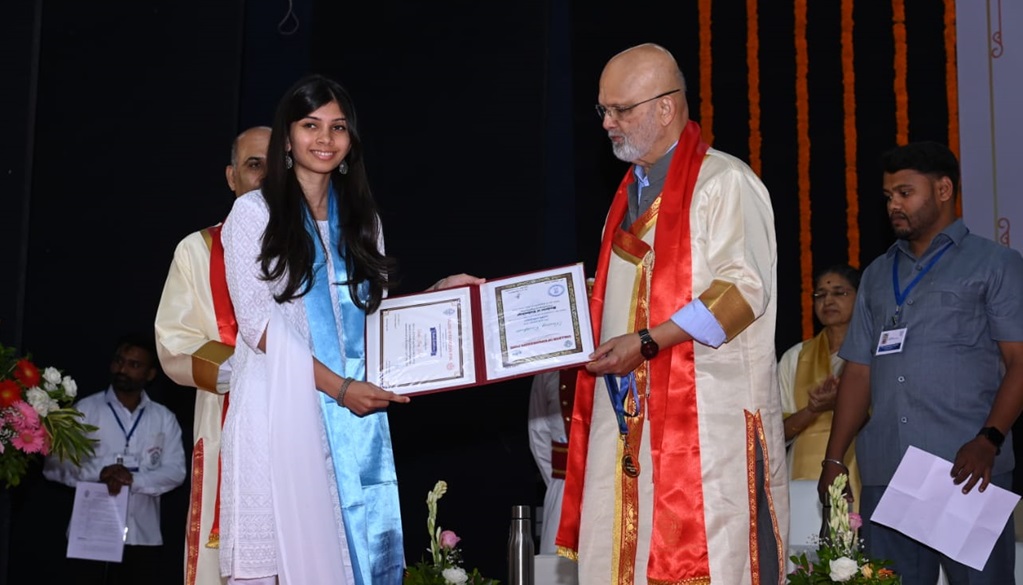[ad_1]
Pune, 28th August 2024: Maharashtra Governor C. P. Radhakrishnan emphasized the importance of balancing technology with traditional learning during his address at COEP Tech University’s inaugural convocation ceremony. He advised students to dedicate at least one hour daily to reading printed books as a way to rejuvenate and expand their knowledge. “Even if your work keeps you glued to a laptop for long hours, make it a habit to close it and spend an hour with a printed book. It’s essential for both refreshing your mind and gaining new insights,” he urged the graduates.
The convocation was graced by prominent figures including Dr. Pramod Chaudhari, Chairman of the Board of Governance; Prof. Sunil Bhirud, Vice Chancellor; Dr. D. N. Sonawane, Registrar; and Yashodhara Haribhakta, Director of the Board of Examinations at COEP Tech University.
Governor Radhakrishnan lauded the students, noting the historical significance of their graduation from the university’s first convocation. “Today marks a special milestone as your names become part of the university’s history. But now, the challenge is to create your own legacy in the future,” he remarked. He also praised the involvement of women in leadership roles at the university, highlighting the symbolism of a female staff member leading the convocation procession. “This is a testament to the inclusiveness and the active participation of women in the university’s operations,” he added.
Sharing his vision for a developed India, Radhakrishnan reflected on a personal anecdote, saying, “A reporter once asked me about my idea of development. I told him that while today many Indians are queuing outside the American consulate for visas, I envision a future where Americans will line up at the Indian consulate for a visa. That future is here, with students from across the globe coming to India for higher education due to the world-class standards we are setting.”
The Governor also highlighted the establishment of a Tribal University in Maharashtra, aimed at empowering tribal communities through modern education. “The goal is not to keep tribals in their current state but to equip them with the skills to compete globally. Economic development, particularly at the microeconomic level, is crucial for wealth creation,” he stated. He praised Prime Minister Narendra Modi’s commitment to poverty eradication through practical implementation of policies, expressing confidence in a developed India by 2047, driven by the nation’s youth.
Dr. Pramod Chaudhari, in his speech, highlighted COEP’s strategic collaborations, including a partnership with KPMG to position the institution as a global leader in education. “COEP is the top choice for engineering students not just from Maharashtra but across India. Those graduating today must uphold the legacy and values of COEP in their future endeavors,” he said.
Prof. Sunil Bhirud presented an overview of the university’s progress, noting its impressive ranking of 33rd among state universities and 77th in engineering in the NIRF Rankings. “COEP Tech University currently serves 4,600 students, offering 28 postgraduate, 10 undergraduate, and 2 MBA programs. This year, we distributed 105 laptops to students as part of our welfare initiatives and awarded scholarships worth ₹1.4 crore to 330 students,” Bhirud shared.
He further detailed the university’s achievements in placements, with 240 companies participating in campus recruitment this year. “We saw 79% of our undergraduates and 47% of our postgraduates securing placements, with the highest offer being ₹87 lakhs and the average package at ₹12 lakhs,” he added.
Prof. Bhirud also announced the introduction of new courses for working professionals and the translation of six textbooks into Marathi to support technical education in the mother tongue. The university has also secured 24 patents this year, including 10 in the field of medical devices.
Degrees were awarded to successful students across various disciplines, including civil engineering, computational sciences, electrical and communications engineering, mechanical and materials engineering, and management. The event was skillfully anchored by Dr. Kshipra Moghe and Nandini Iyer.
[ad_2]
